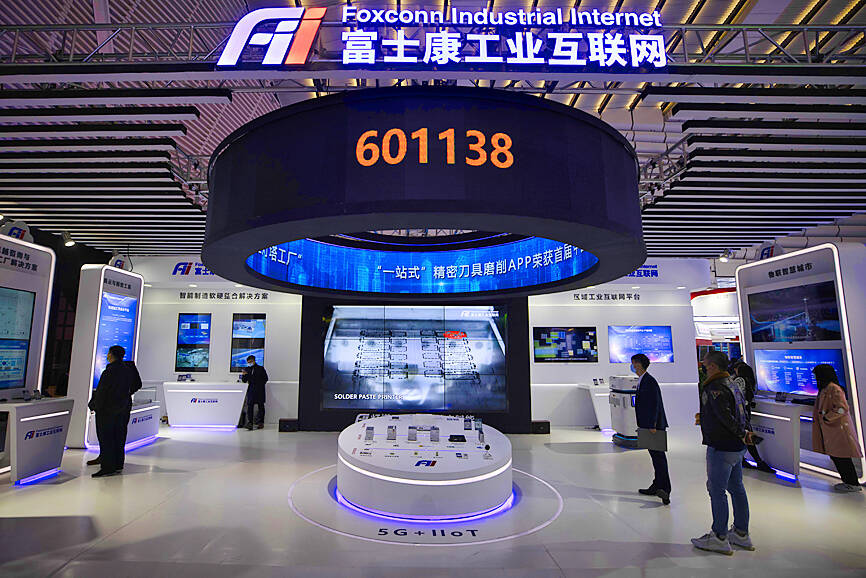Foxconn Industrial Internet Co (FII, 富士康工業互聯網), an Internet-focused subsidiary of Hon Hai Precision Industry Co (鴻海精密), plans to roll out servers for use in space computing within 18 to 24 months, a source close to the project said on Tuesday.
Hon Hai is likely to work with Space Exploration Technologies Corp to develop computing devices for low-orbit satellites in a bid to facilitate communications between Earth and space, market analysts said.
FII has set up a space computing research and development (R&D) team in Taiwan consisting of more than 300 staff, and plans to tap into the growing popularity of micro data centers by launching space-grade servers and placing them in orbit, the source said.

Photo: EPA-EFE
The company is taking advantage of its efforts to develop artificial intelligence (AI) to enter the space computing sector, the source said.
FII has held talks with two potential clients that are interested in the company’s space computing applications, the source said.
It has intensified efforts to develop servers used in AI, and has set up surface-mount technology production facilities in Taiwan, Mexico, the US and Vietnam for high-end AI device development, they said.
Such expansion indicates that the company is placing more emphasis on advanced servers for AI applications outside China, the source said.
FII has also entered the cloud gaming business, with major research and development hubs in Taiwan and the US, they said.
The company, which is exploring business opportunities resulting from the growing popularity of ChatGPT, has reported solid demand for high-performance AI servers, which have upgraded computing capacity, the source said.
The company has also entered the data center business by integrating the manufacture of graphics processing units and central processing units, they said.
FII has teamed up with Nvidia Corp to develop advanced AI servers, and has invested in modularized servers, through its 100 percent-owned unit Ingrasys Technology Inc (鴻佰科技), to provide a comprehensive AI server product portfolio, the source said.
AI servers are expected to account for about 30 percent of FII’s total sales this year, they added.
FII reported 511.85 billion yuan (US$74.37 billion) in sales last year — the first time the company has generated sales above 500 billion yuan.
The figure is 16.4 percent higher than a year earlier due to an increase in shipments of products such as servers, wireless communications gadgets and metal middle frames for smartphones, the company said.
Sales generated from cloud computing totaled 212.24 billion yuan last year, with cloud services accounting for 42 percent, FII said.
Microsoft Corp and Alphabet Inc’s Google are among the company’s major clients.
FII plans to use its four IC packaging and testing plants in China, procured from ASE Technology Holding Co (日月光投控) in late 2021, to develop packaging and testing services for third-generation semiconductors, which refers to products that contain silicon carbide and gallium nitride for electric vehicle production, the source said.
Kore Semiconductor Co (新核芯科技), Hon Hai’s first IC packaging and testing firm in Qingdao, China, which specializes in wafer-level packaging technologies used in logic and memory chips, is expected to provide silicon carbide packaging services in the second half of this year, they said.

Intel Corp chief executive officer Lip-Bu Tan (陳立武) is expected to meet with Taiwanese suppliers next month in conjunction with the opening of the Computex Taipei trade show, supply chain sources said on Monday. The visit, the first for Tan to Taiwan since assuming his new post last month, would be aimed at enhancing Intel’s ties with suppliers in Taiwan as he attempts to help turn around the struggling US chipmaker, the sources said. Tan is to hold a banquet to celebrate Intel’s 40-year presence in Taiwan before Computex opens on May 20 and invite dozens of Taiwanese suppliers to exchange views

Application-specific integrated circuit designer Faraday Technology Corp (智原) yesterday said that although revenue this quarter would decline 30 percent from last quarter, it retained its full-year forecast of revenue growth of 100 percent. The company attributed the quarterly drop to a slowdown in customers’ production of chips using Faraday’s advanced packaging technology. The company is still confident about its revenue growth this year, given its strong “design-win” — or the projects it won to help customers design their chips, Faraday president Steve Wang (王國雍) told an online earnings conference. “The design-win this year is better than we expected. We believe we will win

Chizuko Kimura has become the first female sushi chef in the world to win a Michelin star, fulfilling a promise she made to her dying husband to continue his legacy. The 54-year-old Japanese chef regained the Michelin star her late husband, Shunei Kimura, won three years ago for their Sushi Shunei restaurant in Paris. For Shunei Kimura, the star was a dream come true. However, the joy was short-lived. He died from cancer just three months later in June 2022. He was 65. The following year, the restaurant in the heart of Montmartre lost its star rating. Chizuko Kimura insisted that the new star is still down

While China’s leaders use their economic and political might to fight US President Donald Trump’s trade war “to the end,” its army of social media soldiers are embarking on a more humorous campaign online. Trump’s tariff blitz has seen Washington and Beijing impose eye-watering duties on imports from the other, fanning a standoff between the economic superpowers that has sparked global recession fears and sent markets into a tailspin. Trump says his policy is a response to years of being “ripped off” by other countries and aims to bring manufacturing to the US, forcing companies to employ US workers. However, China’s online warriors